How Probiotics Influence Mood Through the Gut-Brain Axis
Introduction
It might surprise you to learn that your gut — not your brain — produces most of your serotonin, the “feel-good” neurotransmitter responsible for mood balance, emotional regulation, and even sleep quality.
Yes, your microbiome — the vast community of bacteria living inside your digestive system — has a direct line of communication with your brain. This is known as the gut-brain axis, and it’s one of the most fascinating discoveries in modern mental health science 🌿.
Emerging research shows that probiotics — live beneficial bacteria found in fermented foods and supplements — can play a major role in regulating mood, anxiety, and resilience to stress by improving gut health.
In this article, we’ll explore how probiotics affect your emotions, the science behind the gut-brain connection, which strains are most effective for mental well-being, and how to incorporate them into your daily routine for a happier, calmer mind.
Looking for supplements for Brain Fog? Click here.
🌿 The Gut-Brain Axis: Your Internal Communication Highway
The gut-brain axis is a two-way communication network linking your digestive system and your central nervous system through nerves, hormones, and immune molecules.
Think of it as a phone line between your gut and brain — constantly sending messages back and forth.
When your gut microbiome is balanced and diverse, it sends positive signals that promote calmness and mental clarity. But when it’s disrupted (due to poor diet, stress, or antibiotics), those signals become distorted — leading to inflammation, anxiety, and even depression.
💬 In other words, your gut bacteria help shape how you feel, think, and respond to life’s challenges.
🧬 How Gut Bacteria Affect Mood

The gut microbiome produces or influences nearly every key neurotransmitter linked to emotional health:
| Neurotransmitter | Gut Role | Emotional Effect |
|---|---|---|
| Serotonin | 90% made in the gut | Regulates mood, sleep, and calm |
| Dopamine | Produced by gut microbes | Motivation, pleasure, focus |
| GABA | Synthesized by probiotics | Reduces anxiety and promotes relaxation |
| Acetylcholine | Influenced by microbiota | Cognitive sharpness and memory |
When your microbiome is healthy, these neurotransmitters function optimally. When it’s imbalanced, you may experience anxiety, brain fog, irritability, or mood swings.
⚙️ The Role of the Vagus Nerve
The vagus nerve acts as a superhighway between the gut and brain.
It transmits messages from the enteric nervous system (your “second brain” in the gut) directly to emotional centers in the brain like the amygdala and prefrontal cortex.
Certain probiotics — such as Lactobacillus rhamnosus — have been shown to stimulate the vagus nerve, reducing anxiety and promoting relaxation.
🧘 A calmer gut sends calmer signals to your brain.
🔥 Gut Inflammation and Emotional Dysregulation
When gut bacteria are imbalanced, the intestinal barrier becomes “leaky,” allowing inflammatory molecules to enter the bloodstream.
This “leaky gut” can cause systemic inflammation, which affects the brain by:
Disrupting neurotransmitter balance
Triggering oxidative stress
Activating the body’s stress response
Chronic inflammation has been linked to depression, fatigue, and emotional flatness.
Probiotics help by repairing the gut barrier, lowering inflammation, and restoring harmony between the gut and brain.
🌸 The Science Behind Probiotics and Mood
Let’s look at what the research says.
🧠 Probiotics and Anxiety
A 2011 Proceedings of the National Academy of Sciences study found that mice given Lactobacillus rhamnosus showed lower cortisol levels and reduced anxiety-like behavior.
Later human studies confirmed similar effects:
A 2016 Frontiers in Aging Neuroscience trial found that probiotics improved mood and reduced anxiety in healthy adults.
A 2017 Journal of Neurogastroenterology and Motility review showed that probiotic strains like Lactobacillus and Bifidobacterium reduce symptoms of anxiety and stress in both animals and humans.
✨ Probiotics may act as natural anti-anxiety agents — by calming inflammation and regulating neurotransmitters.
🌿 Probiotics and Depression
A 2017 Nutrients meta-analysis concluded that probiotic supplementation significantly reduced symptoms of depression, particularly in individuals under chronic stress.
In a 2016 Nutrition study, people taking a multistrain probiotic (Bifidobacterium longum and Lactobacillus helveticus) for 8 weeks showed improved mood, lower cortisol, and better sleep compared to placebo.
🧬 These “psychobiotic” strains directly influence serotonin and tryptophan metabolism — the same pathway targeted by antidepressant medications.
🧘 Probiotics and Stress Resilience
In high-stress environments, probiotics have been shown to reduce the intensity of the stress response.
A 2016 Brain, Behavior, and Immunity study found that participants under exam stress who took probiotics had lower cortisol and fewer mood disturbances.
💬 By restoring gut balance, probiotics help you feel more emotionally grounded and adaptable.
🍶 Which Probiotic Strains Help with Mood?
Not all probiotics have the same effects — certain strains are especially powerful for mental health.
Here are the best-researched “psychobiotic” strains for mood balance:
| Strain | Key Benefit | Mechanism |
|---|---|---|
| Lactobacillus rhamnosus GG | Reduces anxiety | Stimulates GABA receptors via vagus nerve |
| Bifidobacterium longum 1714 | Lowers stress | Reduces cortisol, improves cognitive focus |
| Lactobacillus helveticus R0052 | Improves mood | Increases serotonin synthesis |
| Bifidobacterium bifidum | Reduces inflammation | Supports gut barrier integrity |
| Lactobacillus plantarum | Boosts energy and clarity | Improves mitochondrial health |
| Bifidobacterium breve | Enhances emotional balance | Modulates dopamine and serotonin |
💊 A multi-strain supplement often provides the best results by targeting several pathways simultaneously.
🥗 Diet and Lifestyle Factors That Support the Gut-Brain Axis
Probiotics work best when supported by gut-friendly nutrition and habits.
🥦 Eat Prebiotic-Rich Foods
Prebiotics are fibers that feed good bacteria.
Include:
Garlic, onions, and leeks 🧄
Bananas 🍌
Asparagus, oats, and apples 🍏
Jerusalem artichoke 🌿
🥛 Enjoy Fermented Foods
Natural probiotic sources:
Yogurt and kefir
Sauerkraut and kimchi
Miso and tempeh
Kombucha
💬 These foods replenish beneficial microbes daily and enhance mood-supporting effects.
Looking for supplements for Brain Fog? Click here.
☀️ Manage Stress and Sleep
Chronic stress disrupts gut flora, while sleep deprivation reduces microbiome diversity.
Practice mindfulness or breathwork (even 5 minutes counts!)
Keep a consistent sleep schedule
Spend time outdoors to support circadian rhythm and microbial diversity
Want to try Breathwork? Click Here.
🚶 Move Daily
Moderate exercise improves both gut health and mental health.
A 2020 Frontiers in Microbiology study found that regular physical activity increases microbiome diversity, leading to better stress resilience and reduced anxiety.
🌿 The Gut-Immune-Mood Triangle
Your gut isn’t just a digestive organ — it’s the control center of your immune system.
Roughly 70% of immune cells reside in the gut. When your microbiome is balanced, it prevents excessive inflammation — protecting the brain from inflammatory cytokines that disrupt mood and motivation.
💬 Healthy gut = calm immune system = stable emotions.
Probiotics like Bifidobacterium infantis have been shown to reduce inflammation markers like IL-6 and TNF-alpha, both linked to depression.
🧘 Breathwork and the Gut-Brain Axis

Breathing and digestion are more connected than you might think.
The vagus nerve, which runs from the brainstem to the gut, regulates both heart rate and digestion.
When you breathe deeply, you activate the vagus nerve, sending “safety” signals to your body.
🌫️ Try This “Gut Calm Breath”:
Inhale slowly through your nose for 4 seconds.
Hold for 2 seconds.
Exhale through your mouth for 6 seconds.
Repeat for 3–5 minutes daily.
Combined with probiotic supplementation, this practice strengthens vagal tone — helping the gut and brain synchronize more effectively.
Want to try Breathwork? Click Here.
🌙 Sleep, Melatonin, and the Microbiome
A healthy gut also influences melatonin, the hormone that regulates sleep.
Certain bacteria — including Lactobacillus plantarum and Bifidobacterium longum — enhance the conversion of tryptophan into serotonin and melatonin.
Better sleep → lower cortisol → improved mood stability 🌙.
💬 Your microbiome works overnight to recharge your emotional batteries.
🌈 The Future of Psychobiotics
“Psychobiotics” is a new term for probiotics that influence mood and cognitive function.
This exciting field suggests that, in the near future, we might treat anxiety or depression by restoring gut balance, not just brain chemistry.
Clinical trials are already exploring probiotics as complementary therapy for:
Depression and dysthymia
Generalized anxiety disorder
Postpartum mood swings
Chronic fatigue syndrome
PTSD
🌿 We’re entering an era where mental health may begin with the gut.
Looking for online therapy ? Click Here.
🧩 How to Choose a Good Probiotic
When selecting a probiotic for mood support, look for these key criteria:
✅ Clinically studied strains — e.g., Lactobacillus helveticus R0052, Bifidobacterium longum 1714.
✅ CFU count: At least 5–20 billion live cultures per dose.
✅ Multi-strain formulas: More diversity = more benefit.
✅ Delayed-release capsules: Protects bacteria from stomach acid.
✅ Third-party testing: Ensures potency and purity.
💊 Tip: Pair your probiotic with a prebiotic fiber supplement for best results.
🍽️ Example of a Gut-Brain Morning Routine
Here’s a simple daily plan to support your gut and mood balance 🌞:
| Time | Routine | Benefit |
|---|---|---|
| 7:30 AM | Drink warm water with lemon | Hydration + digestion boost |
| 8:00 AM | Breakfast with yogurt or kefir | Probiotics + protein |
| 12:30 PM | Lunch with fiber-rich veggies | Prebiotic support |
| 4:00 PM | 10-minute walk or breathwork | Activates vagus nerve |
| 6:30 PM | Dinner with fermented side (sauerkraut) | Microbial diversity |
| 9:00 PM | Calm tea (chamomile/lavender) + probiotic capsule | Gut repair + mood support |
✨ Small consistent habits create big changes in how your gut — and your mood — feel.
🌿 Combining Probiotics with Other Natural Mood Support
Probiotics work even better when combined with mood-supportive nutrients.
| Nutrient | Function | Benefit |
|---|---|---|
| Magnesium Glycinate | Supports GABA | Reduces anxiety and tension |
| Omega-3s (EPA/DHA) | Anti-inflammatory | Enhances serotonin signaling |
| B Vitamins | Co-factors for neurotransmitters | Boosts mood and energy |
| Vitamin D3 | Modulates gut microbiome | Improves resilience and motivation |
| Ashwagandha | Lowers cortisol | Calms the nervous system |
🌱 Together, these form a foundation for mental and digestive harmony.
⚖️ When to Expect Results
Probiotic effects are gradual — they build over time.
Week 1–2: Improved digestion, less bloating.
Week 3–4: Better sleep, calmer mornings.
Week 6–8: Noticeable emotional balance and stress resilience.
💬 Consistency matters more than intensity.
🌼 Key Takeaways
✅ Your gut and brain communicate constantly through the gut-brain axis.
✅ Probiotics regulate mood by influencing serotonin, dopamine, and inflammation.
✅ Strains like Lactobacillus helveticus and Bifidobacterium longum are most effective.
✅ Diet, sleep, and stress management amplify probiotic benefits.
✅ Over time, gut healing = emotional healing 🌿.
💬 A healthy gut creates a happy brain — and a happier you.
📚 References
Cryan, J. F., & Dinan, T. G. (2012). “Mind-altering microorganisms: the impact of the gut microbiota on brain and behavior.” Nature Reviews Neuroscience, 13(10), 701–712.
Messaoudi, M., et al. (2011). “Assessment of a probiotic formulation on anxiety and depression.” Nutrition Research, 31(6), 495–502.
Wallace, C. J. K., & Milev, R. V. (2017). “The effects of probiotics on depressive symptoms.” Nutrients, 9(5), 502.
Allen, A. P., et al. (2016). “Bifidobacterium longum 1714 as a psychobiotic for stress.” Translational Psychiatry, 6(11), e939.
Liu, R. T., et al. (2020). “Probiotics and anxiety: a systematic review.” Frontiers in Psychiatry, 11, 486.
Kelly, J. R., et al. (2016). “Breaking down the barriers: the gut microbiome, intestinal permeability, and stress.” Neurobiology of Stress, 6, 58–70.
Sarkar, A., et al. (2018). “Psychobiotics and the manipulation of bacteria-gut-brain signals.” Trends in Neurosciences, 41(9), 610–623.
Related Posts
-

Nootropics That Promote Calm and Rest
Explore the world of calming nootropics — natural brain enhancers that promote relaxation, better focus, and deeper rest. Learn how L-Theanine, magnesium, ashwagandha, and other adaptogens help balance your nervous system, reduce stress, and support restorative sleep.
-

Best Natural Supplement Stack for Sleep
Discover the best natural supplement stack for deep, restorative sleep. Learn how nutrients like magnesium, L-theanine, glycine, and calming herbs such as chamomile and ashwagandha work together to relax your body, calm your mind, and improve sleep quality—naturally and safely.
-

Combining L-Theanine and Magnesium for Sleep: A Calm Night, Naturally
Discover how combining L-Theanine and Magnesium can help you drift into deep, restorative sleep. Learn how this natural duo calms the mind, relaxes the body, and supports your nervous system—without grogginess the next morning.
-

How to Sleep Better After Intense Workouts
Struggling to fall asleep after a tough workout? Learn how to optimize your post-training recovery with nutrition, hydration, and science-backed sleep strategies. Discover how to calm your nervous system, balance hormones, and wake up fully recharged for your next session.
-

Ashwagandha and Valerian: A Bedtime Combo for Deep Rest and Emotional Reset
Discover the calming synergy of Ashwagandha and Valerian root, two natural sleep aids that help quiet the mind, ease anxiety, and promote deeper rest. Learn how this herbal duo supports the nervous system, balances stress hormones, and restores emotional peace — without next-day grogginess.
-

How to Create a Resilience-Boosting Diet
Discover how to build emotional and physical strength from the inside out with a resilience-boosting diet 🍎. Learn which foods stabilize your mood, how supplements like magnesium and omega-3s strengthen your stress response, and why pairing nutrition with breathwork and therapy creates lasting calm, focus, and vitality 🌿💪.
-

Best Teas and Herbal Blends for Calmness: Nature’s Way to Restore Inner Peace
Ashwagandha, the ancient adaptogenic herb, helps your body find balance during stress. Known as “Indian ginseng,” it supports cortisol regulation, boosts energy, and restores calm clarity. Discover how this powerful root promotes resilience, emotional balance, and steady vitality — one cup at a time. 🌸
-

Parenting and Emotional Strength: How to Raise Children Without Losing Yourself
Empathy is the bridge that connects hearts — the quiet power to understand, feel, and support another’s emotions without judgment. Learn how empathy strengthens relationships, enhances communication, and cultivates deeper compassion in everyday life. 🌿
-

How to Bounce Back from Public Failure: Reclaiming Confidence, Purpose, and Power
Visualization is more than imagination — it’s brain training for resilience. By picturing calm, success, or healing, you activate the same neural pathways as real experience. Learn how daily visualization rewires your brain for confidence, emotional balance, and recovery from stress. ✨
-

Coping with Financial Stress Through Resilience: How to Stay Grounded When Money Feels Tight
Body awareness is the foundation of emotional resilience. By tuning into your body’s signals — tension, fatigue, or calm — you learn to recognize stress before it overwhelms you. Discover how mindfulness, gentle movement, and breathwork can deepen your connection with your body and restore balance from the inside out. 🧘
-

How to Stay Positive During Chronic Illness: A Guide to Emotional Strength and Hope
Creativity is more than art — it’s a form of healing. Whether through painting, writing, music, or small acts of expression, creativity helps release emotion, calm the nervous system, and reconnect you to joy. Discover how to use creativity as a tool for emotional balance, resilience, and self-discovery. 🌿
-

Resilience Tips for Caregivers: How to Stay Strong While Caring for Others
Joy isn’t the absence of pain — it’s the quiet strength to find light even in challenging times. Cultivating joy through small daily moments restores balance, releases stress, and reminds you of life’s beauty. Learn how to reconnect with authentic happiness, rebuild emotional energy, and nurture your nervous system through gratitude, presence, and play. 🌿
-

Building Resilience After a Breakup: How to Heal, Rebuild, and Rise Stronger
Social connection is one of the strongest predictors of emotional resilience. During difficult times, genuine relationships act as anchors — calming the nervous system, reducing stress hormones, and helping you regain perspective. Learn how cultivating real human connection can strengthen your mind, heart, and overall well-being. 🌿
-

How to Stay Emotionally Strong During Job Loss
Your emotions are powered by brain chemistry — a delicate balance of neurotransmitters like serotonin, dopamine, and cortisol. When these chemicals work in harmony, you feel calm, focused, and resilient. Learn how daily habits, nutrition, and mindfulness can support your brain chemistry and boost emotional well-being naturally. 🌿
-

The Role of Hormones in Emotional Stability: How Your Chemistry Shapes Your Calm
Hormones shape more than your body — they shape your emotions, resilience, and sense of calm. From cortisol to serotonin, these chemical messengers influence how you react to stress, connect with others, and recover from challenges. Learn how to balance your hormones naturally to build lasting emotional stability and harmony within. 💫
-

Mitochondria and Emotional Energy: The Cellular Power Behind Your Mood
Breathwork is one of the most powerful tools for emotional regulation and cellular balance. Through intentional breathing, you can calm your nervous system, increase oxygen flow to the brain, and even support mitochondrial energy. Learn how conscious breathing connects body and mind — transforming stress into presence and emotional strength. 🌿
-

Inflammation and Its Impact on Mood Resilience: The Silent Link Between Body and Mind
Inflammation doesn’t just affect the body — it impacts the mind. Chronic inflammation alters brain chemistry, depletes serotonin, and makes emotional recovery harder. Learn how calming inflammation through nutrition, mindfulness, and sleep can restore balance, resilience, and a renewed sense of emotional strength. 💫
-

How Antioxidants Protect Emotional Well-being: The Hidden Link Between Oxidative Stress and Mental Health
Antioxidants do more than protect your body — they defend your mind. By neutralizing oxidative stress, antioxidants support serotonin, dopamine, and brain energy pathways that keep you calm, focused, and emotionally balanced. Discover how foods like berries, green tea, and dark chocolate nourish your brain, boost mood, and strengthen resilience from the inside out. 🌿✨
-

The HPA Axis and Emotional Health: The Hidden Bridge Between Stress and Mind
Neuroplasticity — the brain’s ability to rewire and adapt — is the foundation of emotional healing and resilience. When you face stress, trauma, or change, your neural pathways can reshape themselves to support new patterns of calm, focus, and self-awareness. Learn how daily practices like mindfulness, therapy, and breathwork strengthen neuroplasticity to transform emotional pain into personal growth. 🌸
-

Why Cortisol Control Is Key to Resilience: Mastering Stress to Build Emotional Strength
Controlling cortisol — the body’s main stress hormone — is the secret to lasting resilience. When cortisol levels stay balanced, your mind becomes clearer, emotions steadier, and energy more sustainable. Learn how breathwork, mindset shifts, adaptogens, and daily rhythms can help you calm your stress response and build true inner strength. 🌞💪
-

Dopamine’s Influence on Motivation and Recovery: Reigniting Drive and Balance
Healthy relationships are the foundation of emotional balance and resilience. Whether romantic, familial, or platonic, genuine connection releases dopamine, serotonin, and oxytocin — the brain’s “bonding trio” — helping us feel secure, motivated, and seen. Learn how trust, empathy, and communication not only strengthen your connections but also reshape your nervous system for deeper emotional well-being. 🌿🤝
-

The Role of Serotonin in Resilience: How This “Mood Molecule” Shapes Emotional Strength
Serotonin — often called the “resilience molecule” — plays a vital role in how we handle stress, regulate mood, and recover from emotional challenges. Beyond happiness, this powerful neurotransmitter helps balance the gut-brain axis, stabilize the nervous system, and support emotional flexibility. Learn how nutrition, sunlight, mindfulness, and adaptogens can naturally boost serotonin and strengthen your emotional resilience. 🌞🧠
-

How Neuroplasticity Supports Emotional Growth: Rewiring the Brain for Resilience
Neuroplasticity is the brain’s built-in power to grow, adapt, and heal — and it’s the foundation of emotional transformation. Every mindful breath, compassionate act, or reframed thought strengthens new neural pathways that support resilience and self-awareness. Learn how your brain rewires through daily habits, helping you turn emotional challenges into opportunities for growth and calm. 🌿
-

Tai Chi and Adaptogens for Mind-Body Balance: The Art of Harmonizing Energy and Resilience
Alchemy isn’t just an ancient science — it’s a timeless symbol of transformation and inner balance. By blending the physical and spiritual, alchemy teaches us that change begins from within. Just as metals are refined into gold, we too can transmute emotional pain, stress, and chaos into clarity and strength through mindful practice and self-awareness. 🌙✨
-

Cold Therapy and Emotional Control: Training the Mind Through the Body
Cold therapy isn’t just for athletes — it’s a tool for emotional mastery. By exposing your body to controlled cold, you train your nervous system to stay calm under stress, improving focus, mood, and resilience. This article explores the science of cold exposure, its impact on hormones and the vagus nerve, and how ice baths and cold showers can help you build emotional control, one breath at a time. 🧊🧘♂️
-

How Music Influences Emotional Recovery: The Healing Soundtrack of the Mind
Neuroplasticity — the brain’s ability to rewire and heal itself — is at the heart of emotional recovery. Through mindful habits, music, therapy, and consistent mental stimulation, your brain can form new connections that support resilience and well-being. Discover how neuroplasticity turns pain into growth, helping you rebuild balance, focus, and emotional strength. 🌿
-

Nature Therapy for Building Resilience: Reconnecting With the Healing Power of the Earth
Nature therapy helps rebuild emotional resilience by reconnecting you with the healing rhythms of the Earth. From forest walks to sunlight exposure, nature restores balance to your nervous system, lowers stress hormones, and teaches emotional adaptability. Learn how spending time outdoors can enhance mental clarity, calm anxiety, and awaken your natural capacity to heal. 🌞
-

Breathwork Techniques That Pair with Supplements: The Ultimate Synergy for Stress Relief and Mental Clarity
Breathwork and supplements create a powerful mind-body synergy for stress relief, focus, and energy. By combining intentional breathing with adaptogens, nootropics, and calming nutrients, you can naturally regulate cortisol, sharpen mental clarity, and boost emotional balance. This guide explores the best breathwork techniques and supplement pairings to help you feel centered, calm, and energized from the inside out. 🌿
-

Why Cortisol Balance Matters for Emotional Strength
Balancing cortisol — your body’s main stress hormone — is essential for emotional resilience. When cortisol is chronically high, your mind stays stuck in survival mode, leading to fatigue, anxiety, and emotional instability. This article explores how nutrition, supplements, breathwork, and therapy can help restore healthy cortisol rhythms, regulate the nervous system, and strengthen your ability to handle life’s challenges with calm focus and emotional strength. 🌿
-

Best Supplements for Students During Exam Season: Focus, Energy, and Memory Support
Studying late into the night? Learn which natural supplements can boost focus, memory, and mental stamina during exam season — without the crash. From omega-3s to Bacopa and Rhodiola, discover your brain’s ultimate exam support stack. 🎓🧠
-

Natural Memory Boosters for Seniors: How to Keep Your Mind Sharp and Focused
Stay mentally sharp and confident as you age. Discover science-backed natural supplements and lifestyle habits that boost memory, focus, and brain longevity for seniors. 🌿🧠
-

The Link Between Stress, Cortisol, and Memory Loss
Chronic stress can quietly erode your memory — and cortisol is the key culprit. Learn how stress hormones affect the brain, why the hippocampus shrinks under pressure, and how natural strategies can help you restore memory and mental clarity. 🧠✨
-

How to Build a Daily Supplement Routine for Memory Health
Want to sharpen your memory and stay mentally clear? Learn how to build a daily supplement routine for memory health — from morning focus to nighttime brain repair. Discover science-backed nutrients that boost recall, focus, and long-term cognitive resilience. 🧠🌿
-

Top 5 Natural Supplements for Memory Recall and Focus
Looking to boost memory and concentration naturally? Discover the top 5 supplements — Bacopa, Ginkgo Biloba, Lion’s Mane, Rhodiola, and Phosphatidylserine — that enhance focus, recall, and long-term brain health. 🧠✨
-

Top Supplements to Balance Mood Naturally
From omega-3s to adaptogens, discover the top natural supplements proven to support emotional balance, reduce stress, and promote inner calm — safely and effectively. 🌿✨
-
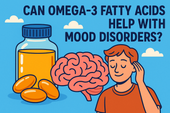
Can Omega-3 Fatty Acids Help with Mood Disorders?
Omega-3 fatty acids do more than support heart health — they can help balance mood, reduce depression, and calm anxiety. Discover how EPA and DHA nourish your brain, fight inflammation, and support emotional well-being from within. 🌊🧠
-

Vitamin D and Mood: The Sunshine Vitamin for Emotional Balance
Could the key to emotional balance be as simple as a little sunlight? Discover how vitamin D — the sunshine vitamin — influences serotonin, reduces inflammation, and helps you feel more positive and resilient year-round. ☀️💛
-

The Role of Magnesium in Reducing Irritability and Low Mood
Feeling on edge or emotionally drained? Magnesium could be the missing link between your body and your mood. Discover how this essential mineral reduces irritability, balances neurotransmitters, and helps your nervous system find calm again. 🌿✨
-
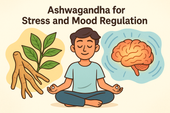
Ashwagandha for Stress and Mood Regulation
Discover how Ashwagandha, the powerful adaptogenic herb 🌿, helps your body manage stress and regulate mood. Learn how it balances cortisol, boosts GABA and serotonin, and supports emotional stability — helping you feel calm, focused, and resilient every day.
-
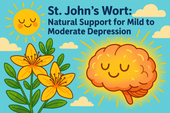
St. John’s Wort: Natural Support for Mild to Moderate Depression
Discover how St. John’s Wort, the “sunshine herb” 🌼, naturally supports mild to moderate depression. Learn how it boosts serotonin, balances mood, and promotes emotional resilience — with research showing its effectiveness compares to antidepressants, but with fewer side effects.
-
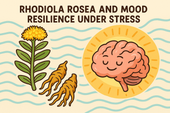
Rhodiola Rosea and Mood Resilience Under Stress
Discover how Rhodiola rosea helps your body adapt to stress 🌿. Learn how this powerful adaptogen balances cortisol, supports serotonin and dopamine, and strengthens emotional resilience — helping you stay calm, focused, and energized under pressure.
-

Chamomile and Lavender: Herbal Calm for Emotional Fluctuations
Discover how chamomile and lavender bring calm to emotional ups and downs 🌿. Learn how these two soothing herbs balance your nervous system, ease anxiety, and support restful sleep — naturally helping you find peace and emotional stability.
-
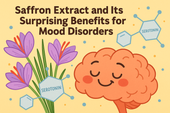
Saffron Extract and Its Surprising Benefits for Mood Disorders
Discover how saffron extract — the golden spice of joy 🌸 — can naturally support mood balance, ease anxiety, and lift mild depression. Learn what science says about its serotonin-boosting power, the ideal dosage, and how this ancient remedy compares to modern antidepressants.
-
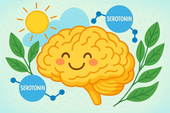
5-HTP and Serotonin: A Natural Path to Lifting Mood
Discover how 5-HTP naturally boosts serotonin 🌞 — the neurotransmitter behind mood, sleep, and emotional balance. Learn how this plant-derived compound supports happiness, reduces anxiety, and improves rest by helping your brain create more serotonin the gentle, natural way.
-
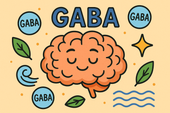
GABA Supplements for Reducing Anxiety and Mood Swings
Discover how GABA supplements can help reduce anxiety and balance mood naturally 🌿. Learn how this calming neurotransmitter works to quiet the mind, ease stress, and improve sleep — plus which nutrients and habits can boost your body’s own GABA production for long-term emotional stability.
-
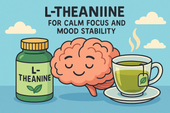
L-Theanine for Calm Focus and Mood Stability
Discover how L-theanine, the calming compound found in green tea 🍵, promotes focus, relaxation, and mood stability. Learn the science behind how it balances neurotransmitters, reduces stress hormones, and enhances clarity — helping you stay centered, calm, and productive without sedation.
-
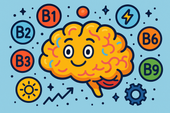
B Vitamins and Brain Chemistry: Supporting Energy and Emotional Balance
Discover how B vitamins power your brain chemistry ⚡. Learn how B6, B9, and B12 support serotonin, dopamine, and energy production — helping boost focus, mood, and emotional balance. From diet to supplements, explore how this vital nutrient group keeps your mind resilient and your energy steady.
-

N-Acetyl Cysteine (NAC) and Mood Disorders: What the Research Says
Learn how N-Acetyl Cysteine (NAC) supports brain health and mood balance 🧠. Discover how this antioxidant helps reduce oxidative stress, regulate glutamate, and improve emotional stability in depression, bipolar disorder, and anxiety — backed by cutting-edge psychiatric research.
-

Supplements for Bipolar Disorder: What May Support Stability
Discover the best supplements for bipolar disorder 🌿 that may support emotional stability and brain health. Learn how nutrients like omega-3s, magnesium, vitamin D, and NAC can help reduce inflammation, balance neurotransmitters, and complement traditional treatment safely.

















































